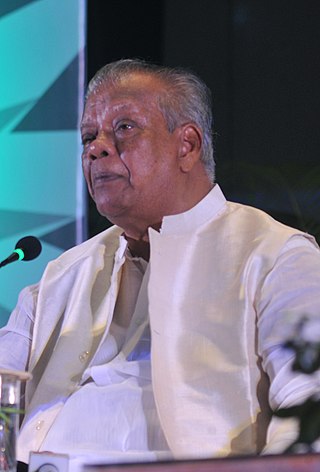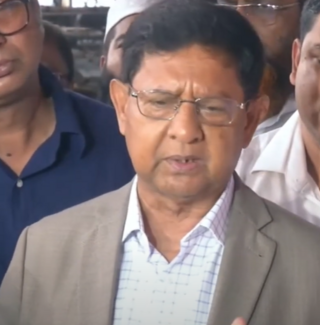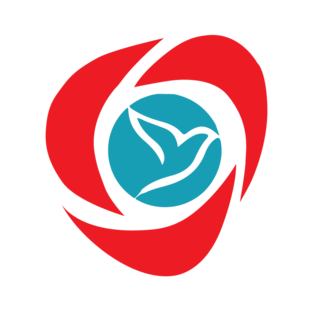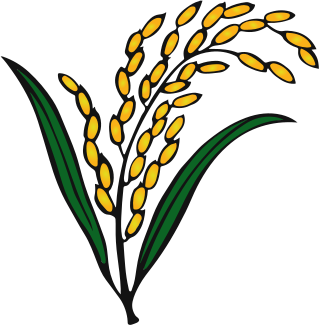
Politics of Bangladesh takes place in a framework of a parliamentary representative democratic republic, whereby the Prime Minister of Bangladesh is the head of government and of a multi-party system. Executive power is exercised by the government. Legislative power is vested in both the government and parliament. The Constitution of Bangladesh was written in 1972 and has undergone seventeen amendments.

The Bangladesh Awami League, simply known as Awami League, is one of the major political parties in Bangladesh. The oldest existing political party in the country, the party played the leading role in achieving the independence of Bangladesh. It is also one of the two most dominant parties in the country, along with its archrival Bangladesh Nationalist Party.

Bangladesh elects on national level a legislature with one house or chamber. The unicameral Jatiyo Sangshad, meaning national parliament, has 350 members of which 300 members are directly elected through a national election for a five-year term in single-seat constituencies while 50 memberships are reserved for the women who are selected by the ruling party or coalition. The Prime Minister is the head of the government. The president who is the head of the state is elected by the National Parliament. The president of Bangladesh is a ceremonial post and does not exercise any control over the running of the state.

Abdul Kader Siddique is a Bangladeshi politician. He served as a Mukti Bahini member and organizer of the Bangladesh Liberation War. He fought with an estimated 17,000-strong guerrilla force in the Tangail region against the Pakistan Army. The army was called Kaderia Bahini. At the end of the war in 1971, Siddique's forces entered Dhaka along with the Indian forces, signaling the end of the war. He was awarded Bir Uttom by the Government of Bangladesh. Since 1999, he has been serving as the leader of his newly formed party, the Krishak Sramik Janata League.
The Bangladesh Krishak Sramik Awami League was a political front comprising the Bangladesh Awami League, the Communist Party of Bangladesh, the National Awami Party (Muzaffar) and Bangladesh Jatiya League.

Ataur Rahman Khan was a Bangladeshi lawyer, politician and writer, who served as the chief minister of East Pakistan from 1 September 1956 – March 1958, and as the prime minister of Bangladesh from 30 March 1984 to 1 January 1985.

The Grand Alliance is a Bangladeshi big-tent electoral alliance of right-wing to far-left political parties in the leadership of Bangladesh Awami League formed before the 2008 general election. The party was a de-facto merger of the 14 Party Alliance with the Jatiya Party and LDP, although the 14 Party Alliance remained active individually. The Grand Alliance is regularly reformed before elections.
The 20 Party Alliance was a Bangladeshi coalition of right-wing political parties, led by the Bangladesh Nationalist Party. It was originally formed as the 18 Party Alliance on 18 April 2012 in Dhaka, extending its predecessor the Four Party Alliance. The 18 Party Alliance was formed in an effort to strengthen the opposition's demands for restoring the caretaker government system used between 1996 and 2008. The main rival of this alliance is the Grand Alliance, led by Awami League, which came into power after the election in 2008.

General elections were held in Bangladesh on 30 December 2018 to elect 300 directly-elected members of the Jatiya Sangsad. The result was another landslide victory for the Awami League-led Grand Alliance led by Sheikh Hasina. The elections were marred by violence, and were widely considered by opposition politicians and the international community to be rigged.

Golam Dastagir Gazi is a Bangladeshi industrialist and a politician of Bangladesh Awami League party. He is a former Jatiya Sangsad member representing the Narayanganj-1 constituency. In January 2019, he was selected as the minister of textiles and jute.

Jatiya Oikya Front was a Bangladesh-based political alliance of primarily four parties led by Kamal Hossain. The front officially declared its formation on October 13, 2018 at the National Press Club ahead of the national election.

Mostafa Mohsin Montu is a Bangladeshi politician and former member of parliament. He is the incumbent secretary general of Gano Forum splinter fraction.
AKM Sarwar Jahan Badsha is a Bangladeshi politician and former Jatiya Sangsad member representing the Kushtia-1 constituency.
Mohiuddin Ahmed, also known by his daak naam Panna Mia, was a Bangladeshi politician. He was elected a member of parliament in 1973, 1979 and 1991. He was posthumously awarded with an Ekushey Padak in 2000.

The 2022 Rangpur City Corporation election was a Bangladeshi local governmental election held on 27 December 2022. The City Corporation elections are held every five years, and this was the third of its kind in Rangpur. The mayor and 44 councilors of the corporation were elected in this election. A total of 9 candidates contested in the mayoral election, and other 246 contesting for general councils and reserved (women) seats. Jatiya Party's Mostafizar Rahman Mostafa held the mayoral post by winning in a huge margin with ruling Awami League's candidate landing as fourth.

The Sheaf of Paddy is the political symbol of the Bangladesh Nationalist Party (BNP).

General elections are held in Bangladesh to elect members of the Jatiya Sangsad, the unicameral national parliament. The Jatiya Sangsad consists of 300 members elected by first-past-the-post voting in single-member constituencies and 50 seats reserved for women, which are allocated based on the proportional vote share received by parties. Elections are overseen by the Bangladesh Election Commission.
The Bangladesh Krishak Sramik Awami League was a political party established in 1983 by expelled members of the Bangladesh Awami League. Abdur Razzaq was the founder of this party. In the 2022 meeting of the Central Executive Parliament of Bangladesh Awami League, politicians admitted that after the creation of the BAKSAL, the party faced loss.

The Plough is the political symbol of the Jatiya Party (E) in Bangladesh, Jammu & Kashmir National Conference in India and Rastriya Prajatantra Party and Rastriya Prajatantra Party (Samyukta) in Nepal.











